 WASHINGTON-What do Japan and Iran have in common? Japan has nuclear power plants and Iran is on its way to acquiring nuclear technology. Japan is prone to powerful earthquakes, and so is Iran. This is where the similarities end.If a similar earthquake was to hit one of Iran's nuclear facilities, the consequences could be expected to be far worse, affecting oil production in the Gulf region and sending the price of a barrel of oil skyrocketing. When a quake measuring 6.8 as on the Richter scale struck the Kashiwazaki-Kariwa nuclear plant earlier this week causing radiation leakage, it raised alarm among the public and shook the government's plans to expand its nuclear power industry, both at home and as a potential export product. The only reason a real disaster was averted is largely due to Japan's extremely strict building laws.The quake killed nine people, left more than 1,000 injured, and forced thousands out of their homes and into makeshift shelters. But the quake also revealed something far more frightening for the safety of the world at large: If Japan, with all its preparedness and its advanced technology, succumbed to such an unfortunate-and hazardous-accident, what would happen in the eventuality of Iran's nuclear installations being hit by a similar quake, or one even more powerful?The earthquake that shook the seven nuclear power plants in the Kashiwazaki-Kariwa complex was designed to withstand the force of a 6.5 quake. As it turned out, the quake registered 6.8 and caused about 50 different problems at the power plant, such as a fire, nuclear material seeping into water, and-unbelievable as it may sound-caused more than 400 drums containing low-level radioactive waste to topple over. And due to the severity of the quake, some of the drums broke open.And that happened in a country that takes its earthquake preparation very seriously. The architects of the plants had considered it unlikely that an earthquake would affect the plant in such a way. The Japanese have installed extremely advanced safety standards aimed to cut down possibility of accidents happening, such as the ones that were caused by the quake.It took about two hours for firefighters to extinguish the fire that had broken out as a result of the earthquake. This was the first time a nuclear plant was hit by an earthquake in Japan. Officials the next day spoke of reports "of a leak of radioactive water from one of three reactors into the Sea of Japan." The Kashiwazaki-Kariwa nuclear-power complex, one of the world's largest nuclear plants, is run by the Tokyo Electric Power Co. With its seven reactors, it has a capacity to generate about 8,000 megawatts.Now what would happen if the scenario was to unfold in Iran, where the building codes are not nearly as strict as those of Japan, and several of Iran's nuclear facilities are situated near highly populated urban areas...?
WASHINGTON-What do Japan and Iran have in common? Japan has nuclear power plants and Iran is on its way to acquiring nuclear technology. Japan is prone to powerful earthquakes, and so is Iran. This is where the similarities end.If a similar earthquake was to hit one of Iran's nuclear facilities, the consequences could be expected to be far worse, affecting oil production in the Gulf region and sending the price of a barrel of oil skyrocketing. When a quake measuring 6.8 as on the Richter scale struck the Kashiwazaki-Kariwa nuclear plant earlier this week causing radiation leakage, it raised alarm among the public and shook the government's plans to expand its nuclear power industry, both at home and as a potential export product. The only reason a real disaster was averted is largely due to Japan's extremely strict building laws.The quake killed nine people, left more than 1,000 injured, and forced thousands out of their homes and into makeshift shelters. But the quake also revealed something far more frightening for the safety of the world at large: If Japan, with all its preparedness and its advanced technology, succumbed to such an unfortunate-and hazardous-accident, what would happen in the eventuality of Iran's nuclear installations being hit by a similar quake, or one even more powerful?The earthquake that shook the seven nuclear power plants in the Kashiwazaki-Kariwa complex was designed to withstand the force of a 6.5 quake. As it turned out, the quake registered 6.8 and caused about 50 different problems at the power plant, such as a fire, nuclear material seeping into water, and-unbelievable as it may sound-caused more than 400 drums containing low-level radioactive waste to topple over. And due to the severity of the quake, some of the drums broke open.And that happened in a country that takes its earthquake preparation very seriously. The architects of the plants had considered it unlikely that an earthquake would affect the plant in such a way. The Japanese have installed extremely advanced safety standards aimed to cut down possibility of accidents happening, such as the ones that were caused by the quake.It took about two hours for firefighters to extinguish the fire that had broken out as a result of the earthquake. This was the first time a nuclear plant was hit by an earthquake in Japan. Officials the next day spoke of reports "of a leak of radioactive water from one of three reactors into the Sea of Japan." The Kashiwazaki-Kariwa nuclear-power complex, one of the world's largest nuclear plants, is run by the Tokyo Electric Power Co. With its seven reactors, it has a capacity to generate about 8,000 megawatts.Now what would happen if the scenario was to unfold in Iran, where the building codes are not nearly as strict as those of Japan, and several of Iran's nuclear facilities are situated near highly populated urban areas...?To read more go to:
As in the days of Noah....

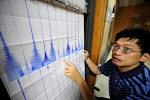
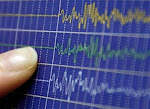
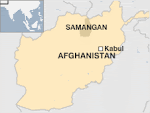







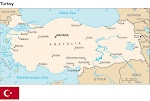
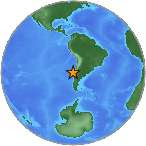




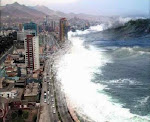

.jpg)


.bmp)
No comments:
Post a Comment